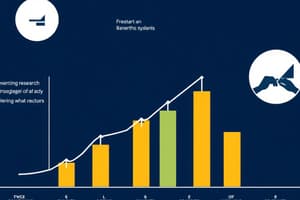Podcast
Questions and Answers
What is the primary goal of a literature review in a management research project?
What is the primary goal of a literature review in a management research project?
- To focus solely on qualitative research methods.
- To collect original data for the project.
- To implement untested hypotheses.
- To identify gaps in current knowledge and position new research. (correct)
If a management project aims to test a hypothesis using numerical data, which research approach is most suitable?
If a management project aims to test a hypothesis using numerical data, which research approach is most suitable?
- Qualitative research.
- Inductive research.
- Primary research.
- Quantitative research. (correct)
Which research approach involves observing patterns and collecting data to develop new theories?
Which research approach involves observing patterns and collecting data to develop new theories?
- Deductive approach.
- Qualitative approach.
- Quantitative approach.
- Inductive approach. (correct)
What type of data is 'existing information from previous research' considered?
What type of data is 'existing information from previous research' considered?
A management project seeks to explore human behavior and motivations, which approach would be most suitable?
A management project seeks to explore human behavior and motivations, which approach would be most suitable?
When a research project begins with existing theories and uses data to verify them, what process is being used?
When a research project begins with existing theories and uses data to verify them, what process is being used?
What distinguishes primary data from secondary data in a research project?
What distinguishes primary data from secondary data in a research project?
What guides the logical flow of a management research project, influencing how the data will be interpreted?
What guides the logical flow of a management research project, influencing how the data will be interpreted?
What is the primary focus of an inductive approach?
What is the primary focus of an inductive approach?
Which approach is best suited when exploring new territories where existing theories may not be applicable?
Which approach is best suited when exploring new territories where existing theories may not be applicable?
What is the starting point for research using a deductive method?
What is the starting point for research using a deductive method?
In a deductive approach, what is the purpose of collecting empirical evidence?
In a deductive approach, what is the purpose of collecting empirical evidence?
Which is a defining characteristic of a deductive approach to research?
Which is a defining characteristic of a deductive approach to research?
What type of data is typically collected for an inductive approach?
What type of data is typically collected for an inductive approach?
What is the relationship between inductive and deductive reasoning?
What is the relationship between inductive and deductive reasoning?
What is NOT a characteristic of an inductive approach?
What is NOT a characteristic of an inductive approach?
Flashcards
Inductive Research Approach
Inductive Research Approach
Involves collecting data and observing patterns to develop new theories.
Deductive Research Approach
Deductive Research Approach
Tests existing theories or hypotheses by analysing collected data.
Quantitative Research
Quantitative Research
Focuses on numerical data, using statistical methods to test hypotheses and identify trends.
Qualitative Research
Qualitative Research
Signup and view all the flashcards
Primary Data
Primary Data
Signup and view all the flashcards
Secondary Data
Secondary Data
Signup and view all the flashcards
Literature Review
Literature Review
Signup and view all the flashcards
Research for a Management Project
Research for a Management Project
Signup and view all the flashcards
Inductive Approach
Inductive Approach
Signup and view all the flashcards
Deductive Approach
Deductive Approach
Signup and view all the flashcards
Inductive Reasoning
Inductive Reasoning
Signup and view all the flashcards
Deductive Reasoning
Deductive Reasoning
Signup and view all the flashcards
Research Methodology
Research Methodology
Signup and view all the flashcards
Study Notes
CMI Level 5 Management Project - Research Approaches
- Learning Outcome 1.2: Specify a research approach for the proposed management project.
Research Approaches for Management Projects
-
Research for management projects involves a systematic approach to gather and analyse information.
-
Methods can be both inductive and deductive.
-
Inductive approaches involve collecting data and observing patterns to develop new theories.
-
Deductive approaches test existing theories or hypotheses through data analysis.
Types of Research
-
Quantitative Research: Uses numerical data and statistical methods to test hypotheses and identify trends. It's useful for measuring variables and making generalisations.
-
Qualitative Research: Explores deeper insights into human behavior, motivations, and experiences. Methods include interviews and focus groups.
Data Types
-
Primary Data: Original data collected specifically for the project. It can involve surveys, interviews, observations, or experiments.
-
Secondary Data: Existing information from previous research, reports, or databases. Includes academic papers, industry statistics.
Literature Review
- Review of existing studies and publications related to the project topic.
- Helps understand current knowledge, identify gaps, and position new research in the broader context.
- Is an important part of the research process.
Inductive Approach
- Develops broader generalisations or theories from specific observations.
- Useful for exploring new areas or understanding complex phenomena in-depth, such as customer behavior.
- Starts without predetermined theories.
- Collects qualitative data first to develop theories.
Deductive Approach
- Tests existing theories or hypotheses.
- Starts from established theories and designs research to test those theories against empirical evidence.
- Useful when confirming or refuting theories in a specific context, such as an established management strategy.
- Uses quantitative data for testing hypotheses.
Inductive vs Deductive
- Inductive reasoning moves from specific instances to broader generalisations.
- Deductive reasoning moves from general principles to specific cases.
Quantitative Research
- Collects and analyses numerical data to identify patterns, and test hypotheses.
- Useful for quantifying relationships between variables like customer satisfaction, quantifying employee productivity, or studying market trends.
- Common methods include surveys, experiments, statistical analysis.
Qualitative Research
- Explores deeper insights into human behavior, motivations and experience, often using non-numerical data.
- Helps understand complex issues and gain rich, detailed information, such as understanding organizational culture through in-depth interviews.
Primary v. Secondary Research
- Primary: Direct collection of new data (surveys, interviews) specific to your research goals, though can be time consuming and costly.
- Secondary: Analyzes existing data (reports, academic papers), cost-effective but data may not always perfectly align with need.
Choosing your Approach
- The most appropriate method is determined by project goals, nature of research questions, and available resources.
Studying That Suits You
Use AI to generate personalized quizzes and flashcards to suit your learning preferences.




